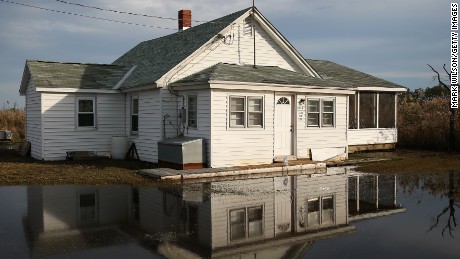Story highlights
- The adoption of Saturday's "Paris Agreement" on climate change wasn't just wonky diplomacy
- John Sutter: For Selina Leem, an 18-year-old from the Marshall Islands, it was about survival
CNN Opinion columnist John D. Sutter is reporting on a tiny number -- 2 degrees -- that may have a huge effect on the future. You can subscribe to the "2 degrees" newsletter or follow him on Facebook, Twitter and Instagram. He's jdsutter on Snapchat. You can shape this coverage.
Le Bourget, France (CNN)For Selina Leem, an 18-year-old from a tiny part of the Marshall Islands in the middle of the Pacific, the adoption of Saturday's "Paris Agreement" on climate change wasn't about wonky diplomacy. It was about the survival of her country.
"This agreement is for those of us whose identity, whose culture, whose ancestors, whose whole being is bound to their lands," she said in the final meeting of the COP21 summit of the U.N. Framework Convention on Climate Change.
"This agreement should be ... a turning point for all of us."
It should be -- and certainly is.
In historic ways that are almost impossible to overstate.
The Paris Agreement, which came out of two weeks often-sleepless negotiations at a conference center here in a Paris suburb, is just the type of blaring signal the world needs that the era of fossil fuels is coming to a rapid close. Countries around the world pledged to do the near-impossible -- limit warming "well below" 2 degrees, and below 1.5 degrees above pre-industrial levels if feasible. That basically requires the world to move rapidly toward 100% clean energy, producing zero net greenhouse gas emissions between about 2050 and 2080.
It's truly a remarkable moment.
Nearly 200 countries working together to avoid superdroughts, rising tides, dangerous floods, deadly heatwaves and other ills associated with run-amok global warming.
And it happened in Paris, of all places, just one month after the terrorist attacks that killed 130 people.
At COP21, countries came together to recognize "that our collective efforts are worth more than the sum of our individual actions," as COP21 President and French Foreign Minister Laurent Fabius put it.
Those ambitions were started quite clearly in the Paris Agreement. And they also were printed, in a simpler, catchier form, on a button pinned to Leem's cardigan.
The message there: "1.5 to stay alive."
It's a simple way to say the Marshall Islands, her home country, could drown beneath rising seas if global temperatures are allowed to warm 2 degrees Celsius.
The treaty alone won't save the islands.
But it does get the world one huge step closer.
"There are many leaders around the room who share with me this hope for saving our world," Leem planned to say in front of delegates Saturday night.
Many countries that adopted the Paris Agreement likely did so for self-interested reasons, at least in part. China, for instance, which is the world's biggest polluter, has seen record smog in Beijing in the past week. The air there is making large cities unlivable.
It also has the world's largest renewable energy market.
So investment there makes sense for its economy.
But the magic of the agreement, to me, is that it also protects small, nowhere islands like those found in the distant Pacific Ocean. It surprised me and other observers that the tiny Marshall Islands emerged as a powerful moral voice, and high-stakes negotiator, at these talks. The country's foreign minister, Tony de Brum, helped rally support for the "High Ambition Coalition," a group of some 100 countries that sought to make the Paris agreement as ambitious as possible, including efforts to put the 1.5-Celsius target in the text.
De Brum made his voice heard on Twitter as well as in negotiation rooms.
"This is who who I am fighting for today," he wrote Saturday morning, attaching a photo of his 8-month old grandchild, who, he told me, is named Tibbok.
De Brum wants Tibbok to have a future in the Marshall Islands.
Wants the country to continue to exist.
The child's name is Marshallese for "to stumble but not fall."
The symbolism wasn't lost on me, or him.
The world has tried its best to screw up climate change -- scuttling agreements like this many times in the past. But perhaps that was just us stumbling, though.
Finding our way to a cleaner future.
Not everything is fixed because of Paris, to be sure. There are far too many climate skeptics with big megaphones in the United States, and far too little support for policies like carbon taxes, which actually would help green economies. Many countries still are funneling massive amounts of money into fossil fuel subsidies. And the climate action pledges that came about as part of this negotiation process only are expected to limit warming to 2.7 degrees.
That's not enough to save the Marshall Islands.
Not yet, at least.
But the treaty also contains provisions for review, every five years starting from a meeting in 2018, and experts are optimistic countries will be able to ratchet up ambitions.
Turning the corner from lofty goals to real policy will take steadfast dedication as well as a change in attitude. That's something Leem already has experience with. This teenager, who loves romance novels and world music, deleted several of her social media accounts, she told me, because she read that computer servers contribute to climate change. She gave up meat, except for fish, she said, because raising animals for agriculture pollutes.
"It makes me feel better, like I'm contributing," she told me.
I hope others will be inspired by her, and by the agreement in Paris.
This is the moment the world dedicated itself to a liveable, clean-energy future.
But it's going to take all of our efforts to actually make that dream a reality.


























